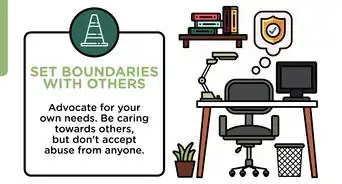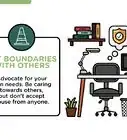This article was co-authored by Leah Morris. Leah Morris is a Life and Relationship Transition coach and the owner of Life Remade, a holistic personal coaching service. With over three years as a professional coach, she specializes in guiding people as they move through both short-term and long-term life transitions. Leah holds a BA in Organizational Communication from California State University, Chico and is a certified Transformational Life Coach through the Southwest Institute for Healing Arts.
There are 11 references cited in this article, which can be found at the bottom of the page.
This article has been viewed 18,565 times.
It’s tough to see the light at the end of the tunnel when it seems that all the odds are stacked against you. Try not to look at negative circumstances as overwhelming and unchangeable. Instead, break up obstacles into smaller parts that you can handle one at a time, and develop strategies to solve specific challenges one by one. Hold yourself accountable, and commit to making the changes your goals require.[1] Work on developing a resilient, positive outlook, and take steps every day to achieve success.
Steps
Overcoming Obstacles
-
1Place obstacles into distinct categories. When it feels like the odds are stacked against you, obstacles can seem overwhelming and insurmountable. Try to break a negative situation into smaller parts that you can tackle individually. Divide obstacles into categories, such as:[2]
- External obstacles that are out of your control, like the economy, natural disasters, or physical limitations. If something is truly out of your control, it’s not worth your stress.
- Internal obstacles, which are things you have some control over, like relationships, debt, and your job and skill set. If you distinguish these from situations out of your control, you can come up with specific ways to overcome them.
- Habitual obstacles, which are habits you can change over time in order to achieve a goal. For instance, committing to healthy dietary changes and getting more exercise will help you lose weight over time.
-
2Break obstacles down into smaller, actionable parts. Breaking down an overwhelming obstacle helps you perceive it as specific and impermanent instead of as all encompassing and permanent. Do your best to divide negative situations into specific problems that you have the power to change.[3]
- For instance, financial problems can seem overwhelming, global, and unchangeable. Instead of perceiving them like a hurricane or earthquake beyond your control, try to see piles of bills as specific issues you can handle by setting a budget, cutting expenses where you can, and seeking a higher paying job.
Advertisement -
3Try to see obstacles as opportunities for growth. Sometimes, you can’t control something that happens to you, but you can control your reaction. Try to develop a positive outlook by reminding yourself that an obstacles are opportunities for self-improvement.[4]
- For instance, if your significant other broke up with you, try to visualize the new opportunities you’ll have to focus on yourself, meet new people, and have new experiences.
- Remember that growth is not always comfortable. It's perfectly normal to feel overwhelmed or uncomfortable at times due to changing circumstances that are not in your control.[5]
-
4Commit to making positive changes. Once you’ve divided obstacles up into smaller, changeable parts, identify changes you should make and stick to them. Hold yourself accountable and do what it takes to achieve your goal.
- Try making a vision board to strengthen your motivation. Place images that represent your goals and obstacles on a poster board, and hang it where you’ll see it every day.
- You could also keep a journal to track your progress. Read it back every few weeks to see how far you’ve come.
- No matter what method you choose to help you stay motivated, recognize that consistency is key in accomplishing your goals.[6]
-
5Deal with challenges as they occur. Procrastination can lead to heaps of problems, making it more difficult to deal with obstacles one by one. When you face a challenge, develop a strategy and handle it immediately. That way, you might be able to prevent overwhelming circumstances when it feels like all the odds are against you.[7]
- For instance, suppose you put off a project for work or school. Then, the night before its due date, you have to bring a family member to the hospital. You can't control their illness, but you'd have less on your plate if you'd completed your project before the last minute.
Cultivating Resilience
-
1Accept your emotions, but don’t let them control your actions. Feeling overwhelmed, afraid, and frustrated are perfectly normal reactions to life’s hurdles. It’s okay to have emotions, but try not to dwell on negative feelings. Allow yourself to feel them, but take time to cool off before you make any decisions.[8]
- Purely emotional responses to negative circumstances are more likely to frame those circumstances as insurmountable.
-
2Try to focus on positive aspects of your life.[9] Making room for positive emotions, like eagerness and hope, in negative situations makes it easier to recover from setbacks. Further, optimistic thinking is better for your overall physical health [10]
- Try making a mental or written list of everything in your life you appreciate. Remember that you can’t change every part of your life, but you can choose to look for the good.[11]
- Suppose your car broke down and a tree limb damaged your house in the same week. Instead of focusing on how it feels like everything is going wrong, be thankful that you weren’t injured when either event happened and you’re physically capable of handling these challenges.
-
3Maintain your physical health. Psychological resilience goes hand in hand with physical health. Try to get seven to nine hours of sleep every night, eat a balanced diet, and exercise at least a half hour every day.[12]
- Sleep, a healthy diet, and exercise can all help curb stress and depression.[13] They also provide your body the energy it needs to fight uphill battles.
-
4Lean on your support system to strengthen your resilience. Reach out to family and friends whenever you’re feeling down about your situation. In addition to your inner social circle, try to find other sources to help you stay resilient.[14]
- Examples could include a support group, place of worship, civic groups, a therapist, or a hobby or sport. Think of something or someone that can help you stay motivated and optimistic.
Achieving Your Goals
-
1Set small, doable goals that lead to your larger goal. Just like obstacles, lofty goals can seem overwhelming. Try to break up a larger goal into smaller, doable parts. That way, you’ll be able to work towards your goal every day instead of getting stuck wondering where to begin.[15]
- For example, if you want to become a teacher, start by breaking the end goal into actionable steps. First, research what degrees and certifications you’ll need. Next, set a timeline of when and how you can earn those requirements. Instead of setting a somewhat vague, unapproachable goal, you’ll have a defined path to success.
-
2Do something every day that brings you closer to your goal. Once you’ve divided a larger goal into multiple steps, work every day to bring yourself closer to your endgame. Even if an accomplishment seems small, it plays a part in a larger whole and will help you cultivate a winning spirit. Every little bit can help you make what seemed at first impossible a reality.[16]
- For instance, even if your daily accomplishment was simply reading a professional magazine or blog about teaching, that’s still a means of self-improvement that brings you closer to your goal.
-
3Be open to different definitions of success. Sometimes, life demands flexibility. While you should stay focused on your end goal, you might have to be open to different definitions of success. Try to make room for uncertainty and unexpected curve balls, and do your best not to be disappointed if you have to switch up your plan.[17]
- Suppose going back to school to become a teacher isn’t currently possible for you. Instead of giving up, think of what inspires to want to become a teacher. Try to find ways that you can engage those passions, like working in a daycare or volunteering with children. Hold out hope that it might be feasible in the future for you to earn the credentials you need to become a full-time teacher.
-
4Find good mentors. Whether you’re trying to achieve professional or personal success, try to find someone who can offer guidance, advice, and constructive criticism. Think of someone you respect who will tell you what you need to hear instead of empty platitudes. Put yourself out there, and let them know that you look up to them and would like their guidance.
Expert Q&A
-
QuestionHow can I follow through with my goals in life?
 Leah MorrisLeah Morris is a Life and Relationship Transition coach and the owner of Life Remade, a holistic personal coaching service. With over three years as a professional coach, she specializes in guiding people as they move through both short-term and long-term life transitions. Leah holds a BA in Organizational Communication from California State University, Chico and is a certified Transformational Life Coach through the Southwest Institute for Healing Arts.
Leah MorrisLeah Morris is a Life and Relationship Transition coach and the owner of Life Remade, a holistic personal coaching service. With over three years as a professional coach, she specializes in guiding people as they move through both short-term and long-term life transitions. Leah holds a BA in Organizational Communication from California State University, Chico and is a certified Transformational Life Coach through the Southwest Institute for Healing Arts.
Life Coach Once you have a goal that is achievable, like a career shift for example, break it down into step-by-step actions that are going to need to happen. Once you have that plan in place, invest your energy in consistently taking action doing those things.
Once you have a goal that is achievable, like a career shift for example, break it down into step-by-step actions that are going to need to happen. Once you have that plan in place, invest your energy in consistently taking action doing those things. -
QuestionHow do I manage stress in life?
 Leah MorrisLeah Morris is a Life and Relationship Transition coach and the owner of Life Remade, a holistic personal coaching service. With over three years as a professional coach, she specializes in guiding people as they move through both short-term and long-term life transitions. Leah holds a BA in Organizational Communication from California State University, Chico and is a certified Transformational Life Coach through the Southwest Institute for Healing Arts.
Leah MorrisLeah Morris is a Life and Relationship Transition coach and the owner of Life Remade, a holistic personal coaching service. With over three years as a professional coach, she specializes in guiding people as they move through both short-term and long-term life transitions. Leah holds a BA in Organizational Communication from California State University, Chico and is a certified Transformational Life Coach through the Southwest Institute for Healing Arts.
Life Coach Maintain healthy habits to help you manage stress. Sleep for 7 to 9 hours each night so you're well-rested. Eat a healthy, balanced diet to nourish your body. Additionally, exercise for at least 30 minutes a day.
Maintain healthy habits to help you manage stress. Sleep for 7 to 9 hours each night so you're well-rested. Eat a healthy, balanced diet to nourish your body. Additionally, exercise for at least 30 minutes a day.
References
- ↑ Leah Morris. Life Coach. Expert Interview. 19 June 2020.
- ↑ https://www.inc.com/kevin-daum/4-tips-for-overcoming-obstacles.html
- ↑ http://www.newyorker.com/science/maria-konnikova/the-secret-formula-for-resilience
- ↑ https://www.ncbi.nlm.nih.gov/pmc/articles/PMC3132556/
- ↑ Leah Morris. Life Coach. Expert Interview. 19 June 2020.
- ↑ Leah Morris. Life Coach. Expert Interview. 19 June 2020.
- ↑ https://www.psychologytoday.com/blog/science-and-sensibility/201207/beyond-adversity
- ↑ https://hbr.org/2011/04/building-resilience
- ↑ Leah Morris. Life Coach. Expert Interview. 19 June 2020.
- ↑ https://www.ncbi.nlm.nih.gov/pmc/articles/PMC1201429/
- ↑ https://www.psychologytoday.com/blog/stop-the-cycle/201308/life-is-tough-overcoming-hardship-and-failure-0
- ↑ https://www.psychologytoday.com/blog/science-and-sensibility/201207/beyond-adversity
- ↑ Leah Morris. Life Coach. Expert Interview. 19 June 2020.
- ↑ http://www.apa.org/helpcenter/road-resilience.aspx
- ↑ https://www.psychologytoday.com/blog/pieces-mind/201605/overcoming-obstacles
- ↑ http://www.apa.org/helpcenter/road-resilience.aspx
- ↑ https://www.psychologytoday.com/blog/pieces-mind/201605/overcoming-obstacles
- ↑ https://www.inc.com/martin-zwilling/9-ways-great-entrepreneurs-succeed-despite-the-odds.html
- ↑ http://www.newyorker.com/science/maria-konnikova/the-secret-formula-for-resilience








































































